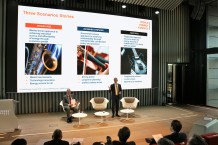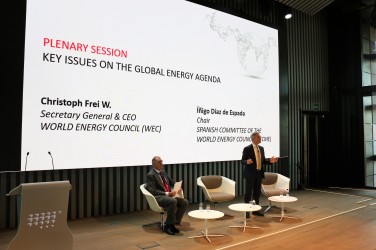The event in Madrid held in collaboration with the Elcano Royal Institute (RIE) and the Spanish Energy Club (Enerclub), sponsored by Cepsa, explored critical issues facing the international energy sector.
Borja Prado, President of Enerclub referred to the main themes addressed at the event as "two of the greatest challenges society is currently facing": climate change and and cybersecurity. He affirmed that these two challenges, which have both a crucial impact on the energy sector, should be addressed from a global and multidisciplinary perspective.
He commented: “The integrity of our assets acquires a new dimension, with the arrival of cybersecurity. Taking advantage of these opportunities will depend, to a large extent, on the ability of technology providers and users, to develop new and proper forms of governance."
The importance of the Cybersecurity Package, recently published by the European Commission, was highlighted by Emilio Lamo de Espinosa, Chairman of RIE.
The EU is well placed to address cybersecurity, given the scope of its policies and the tools, structures and capabilities at its disposal. While Member States remain responsible for national security, the scale and cross-border nature of the threat make a powerful case for EU action providing incentives and support for Member States to develop and maintain more and better national cybersecurity capabilities, while at the same time building EU-level capacity.
This approach is designed to galvanise all actors – the EU, Member States, industry and individuals – to give cybersecurity the priority it needs to build resilience and deliver a better EU response to cyber-attacks. It will bring concrete steps to help detect and investigate any form of cyber incidents against the EU and its Member States and to respond appropriately, including by prosecuting criminals. It will enable EU external action to effectively promote cybersecurity on the global stage.
The result will be a shift for the EU from a reactive to a proactive approach to protecting European prosperity, society and values, as well as fundamental rights and freedoms, through responding to both existing and future threats.
This new package includes the possibility that a Member State, which has received a serious cyber-attack, can request the EU to activate solidarity or mutual defense clauses.
During the Plenary Session, Christoph Frei, Secretary General of the World Energy Council, participated in a debate with Íñigo Díaz de Espada, new Chair of CECME, on the major challenges and new energy realities impacting the sector.
The first-round table of the day, “Cybersecurity in the energy sector”, moderated by Ángel Gómez de Ágreda, Colonel of the Spanish Air Force, explored how best critical infrastructures in the energy sector can be maintained, as well as potential cyber risks associated with the development of the Energy Industry 4.0. The participants all agreed the need for adopting best practices concerning cybersecurity, such as effective information procedures and integrating sustainable strategies within companies.
“Financing energy transitions in emerging countries”, moderated by Carmen Becerril, Former President of ACCIONA ENERGÍA , explored the financial needs merging countries consistent with a pathway towards low greenhouse gas emissions and climate-resilient development. The speakers discussed how financial resources can be mobilised and which are the appropriate mechanisms at national or international level, to effectively drive the energy transition within their countries.
This year's event also included two Monographic Sessions. The first session focused on Spain's “Future Energy Leaders”, with young Spanish energy professionals presenting their experiences of being members of the Council's Future Energy Leaders' Programme.
Olalla Del Río, Secretary General of CECME, presented the second session which previewed key findings concerning Spain identified in the Council's upcoming 2018 World Energy Issues Monitor. The issues perceived as critical uncertainties in Spain for 2018, are aligned with those of the rest of Europe, with digitisation, electricity storage and market design, factored as high.
This year's event convened more than than 240 delegates. Watch the full event here







